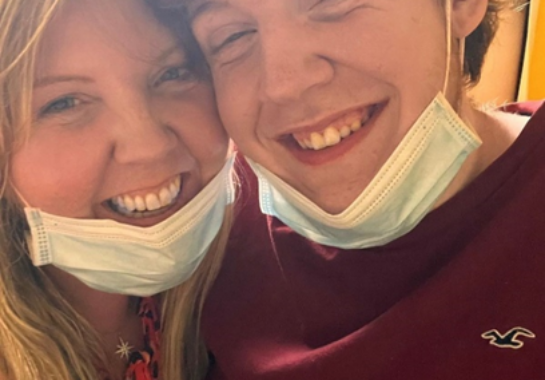Clinical trials help scientists to find new treatments, modify use of existing treatments, help prevent diseases and improve care. By volunteering to take part in research and with the support of his mother, Ted is playing a crucial part in testing how we manage treatment of a condition called eosinophilic esophagitis (EO).
What is Eosinophilic Esophagitis?
EO is a special kind of inflammation of the oesophagus (food pipe) affecting about 1 in 2,000 people. It is a chronic immune system disease that is thought to be caused by certain types of food allergies and environmental factors and may be linked to acid reflux (when acid backs up from your stomach into your oesophagus), or an airborne (seasonal) allergy. It causes the immune system to overreact, prompting a large number of white blood cells called eosinophils to collect in the oesophagus. As a result, the oesophagus becomes inflamed and does not function properly.
The most frequently reported clinical signs are trouble swallowing (which is called “dysphagia” and by which food might get stuck in the oesophagus) and pain during swallowing. The condition can get worse over time and can interfere with quality of life. Although there is no cure, treatment is available.
Ted’s clinical trial
Ted is part of an international research trial led by a pharmaceutical company named Dr Falk Pharma GmbH. The trial is recruiting participants from the UK, EU, and Israel.
Previous studies have shown that patients suffering from EOE have had effective treatment from glucocorticoids with different treatment delivery routes, some that act on the whole body and others that are localised. However, long term treatment with glucocorticoids that act on the whole body may have severe side effects, mostly depending on the duration and the dosage of the medication.
Treatment is randomly allocated on this trial, and some patients will receive a placebo (dummy medication containing no active ingredient) to help scientist compare the effects of the treatment. The study medicine is called Budesonide. This is a glucocorticoid which predominantly acts locally due to its affinity to the target tissue and degrades quickly in the liver thus side effects can be minimised with Budesonide treatment. Different forms of Budesonide are widely used, e.g., as capsules, spray, or enemas. Budesonide, in the form of orodispersable tablets, proved its efficacy for the treatment of EOE in adults and received marketing authorisation in European countries. The Budesonide oral suspension is a new drug formulation especially developed for the treatment of EOE in children and adolescents. The purpose of this clinical study is to investigate whether Budesonide oral suspension is effective for induction of remission in children and adolescents with active EOE to ensure that the active drug is delivered at the site of action (in the gullet = oesophagus).
Ted and his mother, Katie-Jane, have given their thoughts on their experience of participating in this research study at the NIHR Alder Hey Clinical Research Facility. Katie-Jane advises she was, “curious about the unknown”, and “excited to be a part of research for Ted’s condition”. Katie-Jane wanted Ted to take part in research as “research is very important for science to move forward” and they “feel proud to have been chosen to be a part of research.”
With regards to their experience of research at Alder Hey and the care they have received, they “felt so knowledgeable every step of the way” and also “very nurtured.” Ted advises that “the staff are very comforting, and they make sure everything goes as smoothly as possible.”
Katie-Jane has the following advice to other parents who are considering being part of a research trial at Alder Hey:
“Definitely take the opportunity, it has given us so much knowledge about Ted’s condition and it’s an invaluable experience.”
Katie-Jane, Ted’s mum
Dawn Redman, the lead research nurse for Ted’s research study along with research nurses based at the CRF and Clinical Research Division, have got to know him well over the past year, and says:“Ted and his mum were really interested to know all about the research study and very keen to take part. Getting to know Ted and his mum has been great and to see his progress from the start of the clinical trial until the end has been a privilege. For me, seeing improvements in patients’ health is the best part of being a research nurse. Children and young adults taking part in clinical trials can lead to the development of new medicines and treatments around the world and can offer hope to many children and their families.”
Dr Marcus Auth, Consultant in Paediatric Gastroenterology, Hepatology and Nutrition at Alder Hey Children’s NHS Foundation Trust, and Principal Investigator for the trial said:
“We are glad that we are able to run this study at Alder Hey despite all the challenges during COVID-19, thanks to the support from the clinical research team as well as the motivated and patients and families who have been very committed from the start and made it possible to help them effectively and many others with this disease (EOE).”
Dr Marcus Auth
